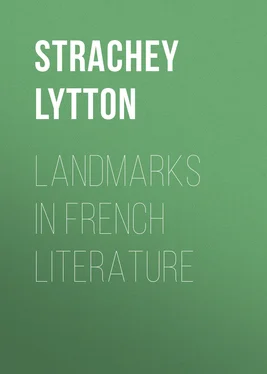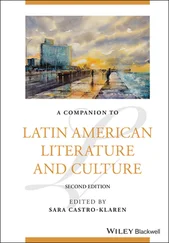Lytton Strachey - Landmarks in French Literature
Здесь есть возможность читать онлайн «Lytton Strachey - Landmarks in French Literature» — ознакомительный отрывок электронной книги совершенно бесплатно, а после прочтения отрывка купить полную версию. В некоторых случаях можно слушать аудио, скачать через торрент в формате fb2 и присутствует краткое содержание. Жанр: Языкознание, foreign_antique, foreign_prose, Зарубежные любовные романы, на английском языке. Описание произведения, (предисловие) а так же отзывы посетителей доступны на портале библиотеки ЛибКат.
- Название:Landmarks in French Literature
- Автор:
- Жанр:
- Год:неизвестен
- ISBN:нет данных
- Рейтинг книги:4 / 5. Голосов: 1
-
Избранное:Добавить в избранное
- Отзывы:
-
Ваша оценка:
- 80
- 1
- 2
- 3
- 4
- 5
Landmarks in French Literature: краткое содержание, описание и аннотация
Предлагаем к чтению аннотацию, описание, краткое содержание или предисловие (зависит от того, что написал сам автор книги «Landmarks in French Literature»). Если вы не нашли необходимую информацию о книге — напишите в комментариях, мы постараемся отыскать её.
Landmarks in French Literature — читать онлайн ознакомительный отрывок
Ниже представлен текст книги, разбитый по страницам. Система сохранения места последней прочитанной страницы, позволяет с удобством читать онлайн бесплатно книгу «Landmarks in French Literature», без необходимости каждый раз заново искать на чём Вы остановились. Поставьте закладку, и сможете в любой момент перейти на страницу, на которой закончили чтение.
Интервал:
Закладка:
The break in the Renaissance movement was largely the result of political causes. The stability and peace which seemed to be so firmly established by the brilliant monarchy of Francis I vanished with the terrible outbreak of the Wars of Religion. For about sixty years, with a few intermissions, the nation was a prey to the horrors of civil strife. And when at last order was restored under the powerful rule of Cardinal Richelieu, and the art of writing began to be once more assiduously practised, the fresh rich glory of the Renaissance spirit had irrevocably passed away. Already, early in the seventeenth century, the poetry of MALHERBE had given expression to new theories and new ideals. A man of powerful though narrow intelligence, a passionate theorist, and an ardent specialist in grammar and the use of words, Malherbe reacted violently both against the misplaced and artificial erudition of the Pléiade and their unforced outbursts of lyric song. His object was to purify the French tongue; to make it—even at the cost of diminishing its flavour and narrowing its range—strong, supple, accurate and correct; to create a language which, though it might be incapable of expressing the fervours of personal passion or the airy fancies of dreamers, would be a perfect instrument for the enunciation of noble truths and fine imaginations, in forms at once simple, splendid and sincere. Malherbe's importance lies rather in his influence than in his actual work. Some of his Odes—among which his great address to Louis XIII on the rebellion of La Rochelle deserves the highest place—are admirable examples of a restrained, measured and weighty rhetoric, moving to the music not of individual emotion, but of a generalized feeling for the beauty and grandeur of high thoughts. He was essentially an oratorical poet; but unfortunately the only forms of verse ready to his hand were lyrical forms; so that his genius never found a full scope for its powers. Thus his precept outweighs his example. His poetical theories found their full justification only in the work of his greater and more fortunate successors; and the masters of the age of Louis XIV looked back to Malherbe as the intellectual father of their race.
Malherbe's immediate influence, however, was very limited. Upon the generation of writers that followed him, his doctrines of sobriety and simplicity made no impression whatever. Their tastes lay in an entirely different direction. For now, in the second quarter of the seventeenth century, there set in, with an extreme and sudden violence, a fashion for every kind of literary contortion, affectation and trick. The value of a poet was measured by his capacity for turning a somersault in verse—for constructing ingenious word-puzzles with which to express exaggerated sentiments; and no prose-writer was worth looking at who could not drag a complicated, ramifying simile through half a dozen pages at least. These artificialities lacked the saving grace of those of the Renaissance writers—their abounding vigour and their inventive skill. They were cold-blooded artificialities, evolved elaborately, simply for their own sake. The new school, with its twisted conceits and its super-subtle elegances, came to be known as the 'Precious' school, and it is under that name that the satire of subsequent writers has handed it down to the laughter of after-generations. Yet a perspicacious eye might have seen even in these absurd and tasteless productions the signs of a progressive movement—the possibility, at least, of a true advance. For the contortions of the 'Precious' writers were less the result of their inability to write well than of their desperate efforts to do so. They were trying, as hard as they could, to wriggle themselves into a beautiful pose; and, naturally enough, they were unsuccessful. They were, in short, too self-conscious; but it was in this very self-consciousness that the real hope for the future lay. The teaching of Malherbe, if it did not influence the actual form of their work, at least impelled them towards a deliberate effort to produce some form, and to be content no longer with the vague and the haphazard. In two directions particularly this new self-consciousness showed itself. It showed itself in the formation of literary salons —of which the chief was the famous blue drawing-room of the Hôtel de Rambouillet—where every conceivable question of taste and art, grammar and vocabulary, was discussed with passionate intensity; and it showed itself even more strongly in the establishment, under the influence of Richelieu, of an official body of literary experts—the French Academy.
How far the existence of the Academy has influenced French literature, either for good or for evil, is an extremely dubious question. It was formed for the purpose of giving fixity and correctness to the language, of preserving a high standard of literary taste, and of creating an authoritative centre from which the ablest men of letters of the day should radiate their influence over the country. To a great extent these ends have been attained; but they have been accompanied by corresponding drawbacks. Such an institution must necessarily be a conservative one; and it is possible that the value of the Academy as a centre of purity and taste has been at least balanced by the extreme reluctance which it has always shown to countenance any of those forms of audacity and change without which no literature can be saved from petrifaction. All through its history the Academy has been timid and out of date. The result has been that some of the very greatest of French writers—including Molière, Diderot, and Flaubert—have remained outside it; while all the most fruitful developments in French literary theory have come about only after a bitter and desperate resistance on its part. On the whole, perhaps the most important function performed by the Academy has been a more indirect one. The mere existence of a body of writers officially recognized by the authorities of the State has undoubtedly given a peculiar prestige to the profession of letters in France. It has emphasized that tendency to take the art of writing seriously—to regard it as a fit object for the most conscientious craftsmanship and deliberate care—which is so characteristic of French writers. The amateur is very rare in French literature—as rare as he is common in our own. How many of the greatest English writers have denied that they were men of letters!—Scott, Byron, Gray, Sir Thomas Browne, perhaps even Shakespeare himself. When Congreve begged Voltaire not to talk of literature, but to regard him merely as an English gentleman, the French writer, who, in all his multifarious activities, never forgot for a moment that he was first and foremost a follower of the profession of letters, was overcome with astonishment and disgust. The difference is typical of the attitude of the two nations towards literature: the English, throwing off their glorious masterpieces by the way, as if they were trifles; and the French bending all the resources of a trained and patient energy to the construction and the perfection of marvellous works of art.
Whatever view we may take of the ultimate influence of the French Academy, there can be no doubt at all that one of its first actions was singularly inauspicious. Under the guidance of Cardinal Richelieu it delivered a futile attack upon the one writer who stood out head and shoulders above his contemporaries, and whose works bore all the marks of unmistakable genius—the great CORNEILLE. With the production, in 1636, of Corneille's tragedy, Le Cid , modern French drama came into existence. Previous to that date, two main movements are discernible in French dramatic art—one carrying on the medieval traditions of the mystery-and miracle-play, and culminating, early in the seventeenth century, with the rough, vigorous and popular drama of Hardy; and the other, originating with the writers of the Renaissance, and leading to the production of a number of learned and literary plays, composed in strict imitation of the tragedies of Seneca,—plays of which the typical representative is the Cléopâtre of Jodelle. Corneille's achievement was based upon a combination of what was best in these two movements. The work of Jodelle, written with a genuinely artistic intention, was nevertheless a dead thing on the stage; while Hardy's melodramas, bursting as they were with vitality, were too barbaric to rank as serious works of art. Corneille combined art with vitality, and for the first time produced a play which was at once a splended piece of literature and an immense popular success. Henceforward it was certain that French drama would develop along the path which had been opened out for it so triumphantly by the Cid . But what was that path? Nothing shows more strikingly the strength of the literary opinion of that age than the fact that it was able to impose itself even upon the mighty and towering spirit of Corneille. By nature, there can be little doubt that Corneille was a romantic. His fiery energy, his swelling rhetoric, his love of the extraordinary and the sublime, bring him into closer kinship with Marlowe than with any other writer of his own nation until the time of Victor Hugo. But Corneille could not do what Marlowe did. He could not infuse into the free form of popular drama the passion and splendour of his own genius, and thus create a type of tragedy that was at once exuberant and beautiful. And he could not do this because the literary theories of the whole of the cultivated society of France would have been opposed to him, because he himself was so impregnated with those very theories that he failed to realize where the true bent of his genius lay. Thus it was that the type of drama which he impressed upon French literature was not the romantic type of the English Elizabethans, but the classical type of Senecan tragedy which Jodelle had imitated, and which was alone tolerable to the French critics of the seventeenth century. Instead of making the vital drama of Hardy artistic, he made the literary drama of Jodelle alive. Probably it was fortunate that he did so; for he thus led the way straight to the most characteristic product of the French genius—the tragedy of Racine. With Racine, the classical type of drama, which so ill befitted the romantic spirit of Corneille, found its perfect exponent; and it will be well therefore to postpone a more detailed examination of the nature of that type until we come to consider Racine himself, the value of whose work is inextricably interwoven with its form. The dominating qualities of Corneille may be more easily appreciated.
Читать дальшеИнтервал:
Закладка:
Похожие книги на «Landmarks in French Literature»
Представляем Вашему вниманию похожие книги на «Landmarks in French Literature» списком для выбора. Мы отобрали схожую по названию и смыслу литературу в надежде предоставить читателям больше вариантов отыскать новые, интересные, ещё непрочитанные произведения.
Обсуждение, отзывы о книге «Landmarks in French Literature» и просто собственные мнения читателей. Оставьте ваши комментарии, напишите, что Вы думаете о произведении, его смысле или главных героях. Укажите что конкретно понравилось, а что нет, и почему Вы так считаете.












